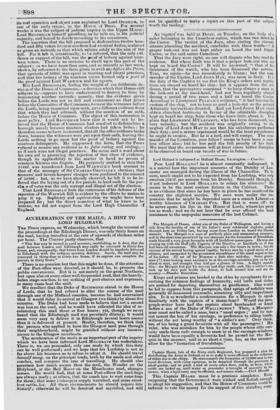An inquest'was held at Dover, on Tuesday, on the body
of a sailor belonging to the Cameleon cutter, which was run down by the Castor. The verdict of the Jury, after stating the circura• stances attending the accident, concludes with these words—" A proper look-out was not kept either on board the said frigate Castor, or the said cutter Cameleon."
That the Jury were right, no one will dispute who has read the evidence. But whose fault was it that a proper look-out was not kept on board the Castor? It will be answered, " that of the lieutenant of the watch, who has been dismissed the service." True, we rejoin—he was immediately to blame; but the corn. mander of the Castor, Lord JOHN HAY, was most in fault. It is the duty of the Captain to see that the King's orders and regula- tions are obeyed on board his ship: but it appears from the evi- dence, that the peremptory command " to keep always a man on the look-out at the mast-head," had not been regularly obeyed during a period of two years and a half on board the Castor. According to Lieutenant PELHAM'S evidence, " it had become the custom of the ship," not to keep as good a look-out as the printed Admiralty instructions directed. And yet Lord JOHN HAY could obtain abundant testimony in favour of the admirable discipline kept on board his ship, from those who knew little about it. It is plain that Lieutenant M'CLEVERTY, who has been dismissed, was very unlucky ; but the accident was originally owing to the neglect of Lord JOHN HAY to see that his subalterns performed their duty ; and a severe reprimand would be the least punishment he ought to receive.. But he is a lord, and will escape. The com- mander of the Cameleon, poor fellow! seems to have been a care- less officer also; but he has paid the full penalty of his fault. We trust that the occurrence will at least cause better discipline to be observed on board our vessels of war in future.




















 Previous page
Previous page